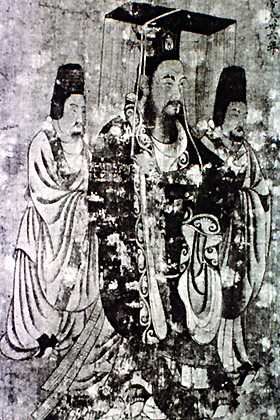
Chinese Mythology and Legends: Corpse under Confucianism

China seems sometimes to used to be called "the Land without Mythology". But please try to think about there are few countries like Greece holding sophisticated and systemized Mythology, and the Greeks love their mythology to use for their literature and poetry, and drama without religious aim. Mythology is primally made from perspective of their natural circumstance, inevitably related to Religion and Respect. Politic and Centralization rouse unification of local mythologies. And oral tradition is succeeded in the process. I can say China keeps "primitive" polytheistic style mythology which monotheist culture and other countries which have taken apart Religion from Mythology like Tibet or Japan.
Archaeology versus Mythology
China still remains many Darkspot for archaeology and we know Legend and
Mythology hint objective facts
which lost during long oblivion and long time. We don't know whether the
Kingdom of Xia (before ?Shang)
was real existence or not. We can read the context of many old scripts
"polluted" by Confucian Doctrine, and
Unified Mythology was destroyed before the movement of unification by Shang
Dynasty. And Confucius revered the tradition of Zhou and obscure, much
undepersonified concept of "Tien". (Providence of Rightful Dynasty
= Justice)
And his successors denied the oral traditions of commoners as heretical
and superstitious, polluted by
dirtiness.
Pinyin and Wade-Giles
Aside from many local variation of modern Chinese Language, notations of
Chinese words are another
problem for Japanese, because Chinese use far more words than Japanese,
grammar word and phonemes
are alien to Japanese, even though Writing System of Japanese is derived
from Chinese Charcters.
There are two ways of system which can be used for writing Chininese with
Alphabet, if you want more about
it, see below.
Intro Chinese to Internet
http://sangle.web.wesleyan.edu/view/
Difference between Japanese Imperial Dynasty and Chinese Imperial Dynasties
Japan adopted many Chinese Confucianism for making the political system under Imperial Court, though
there is great difference, for territory of rule and tradition, and religion.
Japanese Court possitively
accepted chinese type centralization, though Emperors are never fully despotic
monarchs in a sense of
Continental Rulers. And There is only one Dynasty existing in Japanese
History, while Chinese Dynasties are
replaced many times. Perhaps Japan has always required the role of High
Priest, though it hasn't been needed to replace by another, because Authority
and Power are generally kept apart in natural situation, and ancient people
doesn't need to change this system. And Japanese Warlike Aspects in Warring
States Period and Samurai Class
are contrary to Orthodox Confucianism in Ancient China.
(Though this statement is too coarse and rough about the system of Japanese
Emperors, it is right in a sense if you want to see the history from superficiality
of propaganda, and propaganda is important as substance.
(19 / Sep / 2003)
Syncretism: Emperors and Local Gods
In Confucianism Sense, "Teacher didn't teach about Monster, Power,
War and Diety."
(The Analects of Confucius) And historians influenced by this dogma ignore
the resource of Mystical
and Strangeness outside Humanity though they know the difference of Objectivity and Subjectivity.
So Ssuma Chien aka Sima Qian put the biography of "Yellow Emperor"
in his writings.
they defromed Gods to Saintly Kings and Emperors.
And Taoists were not always antagonistic that trend along with the support
of contemporary rulers to
"native religion", so there is always space for Emperors surrounded
by attributes of Taoistic Mysticism,
and Confucianism tolerate it if it seems "traditional".
Practical nature of Chinese
Below is very stereotyped statement:
"Chinese Nationality scarcely stresses the metaphisical idea unlike
to their Indian Neighborhood,
and never permits themselves lyricistic as Japanese, so their Religion
is very secularisitic, and
their History is distorted by their concept to self-confidence for this
aspect."
this statement seems at least conceives some truth. Though such view is
very risky to understanding
the variety and complexity of nationality.
Worship to Imperial Court, Cosmology
iIn Ancient Chinese Court, there is religion, which modelled to Cosmos
itself identified with the Court centered around Emperor. And Harem and
Wives of Emperor were identified as the prosperity and equilibrium. So
Taoism, Alchemy and Astrology were attached great importance though certain
difference of degrees in each
Dynasties. And they adopted Babylonian Astrology and Cosmological View,
and arranged it to
the parallel of Sky World and Empire of Middle World, so Calendar has been
changed as the Dynasty
was replaced, and Emperors were called "Dragon" because they
were mystically important as much as
politically in their cosmology.
Buddhism Structure
Taoism adopts many structures from Buddhism Pantheon which originally derived
from Hinduistic
Gods, (though they might ignore it or insist that original idea is coming
from them, as in the case
Lao-Zu was the former reincarnate of Buddha Siddharuta Gautama.)
And as courts adopted many influence from Taoisitic Religion, see the tale
of Monkey King,below.
Mythology, Legend and Folktale
Chinese always has been good storyteller and poet,
many good examples exist without translation, (relatively available for
similarity and closeness between Japanese Writing System.)
Most good example is below: it was modelled from the famous Buddhism
Priest who travelled to India in Tang Dynasty for pilgrimage and questing
new Buddhism Text.
But in Ming Dynasty, his tale arranged to the category of Fantasy and Romance,
by absorbed many influence
from many other tales.
Monkey King "Hsi Yu Chi" aka "A Journey to the West"
Monkey King
http://www.geocities.com/Tokyo/Ginza/6142/
Chinese Good Links
Kyousenndou (Japanese)
http://member.nifty.ne.jp/kyousen/index.html
Chinese Culture Images
http://acc6.its.brooklyn.cuny.edu/~phalsall/images.html
Su Tzu's Chinese Philosophy Page
http://uweb.superlink.net/~fsu/philo.html
Chinese Knowledge Site
http://www.chinaknowledge.de/index.html
History Timeline of China
http://www-chaos.umd.edu/history/time_line.html
Chinese Literature Classics
http://www.chinapage.com/classic1.html
China the Beautiful
http://www.chinapage.com/china-rm.html
Chinese Mythology
http://www.geocities.com/SunsetStrip/Palms/9540/noframes/chinese.html
Chinese Myths and Fantasies
http://www.chinavista.com/experience/myth/myth.html
Historical Chinese Mythology
http://loki.stockton.edu/~gilmorew/consorti/1keasia.htm
Ancient Chinese Mythologies
http://loki.stockton.edu/~gilmorew/consorti/1keasia.htm
The Golden Elixir Home Page Chinese Alchemy
http://helios.unive.it/~dsao/pregadio/index.html
Taoism - Acupuncture, Alchemy, Feng Shui
http://www.clas.ufl.edu/users/gthursby/taoism/alchemy.htm
Reference
Professor Enn ka (Yuan Ke): Chinese Ancient Myth
Shizuka Shirakawa: Myth of China
Go to the Original Feng Shen Yan Yi (Binding of Gods) Page
Go to Introduction of China for Non-Needhamists of Euro-americans
Go to Chinese Mythic Arts Page